Institutional Context
Summary
Aston University is a research-active, technical university, which was recently ranked as one of the UK’s top 25 universities1. It is located in central Birmingham and is made up of three Colleges: Business and Social Sciences, Health and Life Sciences and Engineering and Physical Sciences.
Our university strategy focuses on our three beneficiary groups: i) students ii) business and the professions and iii) region and society.
Aston’s aim is to provide high-quality teaching and student support; produce collaborative research with high translation and impact; promote skill building and industry development; and foster community engagement.
Public engagement, enterprise and knowledge exchange are crucial to achieving this mission and serving our beneficiary groups.
Institutional context
Aston University’s mission is to be the UK’s leading university for students aspiring to succeed in business and the professions, where original research, enterprise and inspiring teaching deliver local and global impact.
Aston was the UK’s first college of advanced technology, and, when it gained university status in 1966, its Charter made reference to the institution’s original objectives: “to advance, disseminate and apply learning and knowledge by teaching and research, for the benefit of industry and commerce and of the community generally: and to enable students to obtain the advantage of a university education, and such teaching and research may include periods outside the University in industry or commerce or wherever the University considers proper for the best advancement of its objects.”
Our forerunner institution, Birmingham Municipal Technical School, was founded in 1895 by the employers of Birmingham because they could not find the right skills for the city’s dynamic labour market. Since then, Aston has been an integral part of our city and wider region, and a partner to employers and local communities. We are committed to conducting research that improves lives, and delivering knowledge exchange which leads to economic growth, productivity enhancement and social impact. Our university strategy, and everything that flows from it, is led by our beneficiaries: i) students ii) business and the professions and iii) region and society.
We have a history of generating societal benefit through innovation: the blockbuster brain cancer drug Temozolomide originated at Aston University and started us on a path that drives our intellectual property and spinout activity to this day.
Aston University’s distinctive mission is supported by the student journey, emphasising high aspiration and achievement. Ranked second place in the English Higher Education Social Mobility Index for two consecutive years2, key features of Aston education are the integrated placement year, industry-relevant curricula and dedicated support for students and graduates wishing to start businesses. In 2020-23, over 65% of Aston students took a placement year or engaged in clinical practice.
The university prioritises public engagement, knowledge exchange and enterprise to build on our core institutional strengths: employability, small business growth, innovation and research with impact.
These strengths and our beneficiary-led strategy are used to address regional economic challenges. Our region was identified as having 27 of the UK’s 150 left behind wards in 20193, and the West Midlands economy has shrunk further since, being 8% smaller at the end of 2021 than it was at the onset of the Covid pandemic4. Our Civic University Agreement places post-Covid economic recovery at the centre of all our work, and as a Birmingham Anchor Network member we use our economic power for the benefit of local people and businesses.
The university is currently developing its 2030 strategy to transform the institution and the support we offer to our beneficiaries.
For further information, please send queries to j.e.richards@aston.ac.uk
Local Growth and Regeneration
Summary of approach
Aston University is a technical university and an anchor institution based in the heart of Birmingham, serving the people who live, work and study in the West Midlands. We support our diverse student body to achieve social mobility (through a placement year, mentoring and external engagement) and are working closely with partners to fill the region’s skills gaps, whilst driving innovation, productivity and inclusive growth of the economy.
Our ethos is that more impact is achieved by working in partnership, so we adopt a collaborative approach to our activities, working with other universities, civil society, anchor institutions and regional bodies for the benefit of the region.
Aspect 1: Strategy
Context
Aston University’s Strategy 2018-2023 has focused on beneficiaries: students, business and the professions, and region and society. Now developing our 2030 strategy, we will focus on digital transformation and hubs to drive the support of our beneficiaries, people and place. We drive local growth and regeneration starting in our ‘place’, Birmingham, through supporting the social mobility of local students, ensuring our courses produce graduates with the skills for work and filling local skills gaps. We support businesses to benefit from the practical applications of our world-leading research and develop entrepreneurs from all walks of life to start and grow their businesses.
Our Civic Agreement was developed with partners Birmingham City Council, Greater Birmingham and Solihull LEP (GBSLEP), West Midlands Combined Authority (WMCA), Greater Birmingham Chambers of Commerce (GBCC), Aston Villa Football Club, Birmingham Community Healthcare NHS Trust and Aston Students’ Union. This involved mapping partner strategies (including the local industrial strategy, the Strategic Economic Plan | GBSLEP which aims to deliver inclusive and sustainably growth, and recently the West Midlands Plan for Growth) against citizen priorities, university capabilities and discussions with organisational leaders on their priorities to develop our joint plans. The agreement frames Aston’s approach to supporting the region, involving staff and students from every area of the university, ensuring Aston University is a cornerstone of economic growth, and allowing young people to fulfil their potential through key themes:
Figure 1 Our civic university themes
Local voices are important to us, so, in both 2019 and 2022, Aston University commissioned BMG Research to survey 400 citizens across 6 local wards through face-to-face interviews to understand their views of the university and their priorities to inform our approach.
Importance of Collaboration
Aston’s focus on beneficiaries means we listen and engage to address current and future issues, from addressing local skills gaps to navigating the UN Sustainable Development Goals. We do this as an anchor institution across our research, education, business support, alumni support and policy influence.
Aston is a leader and collaborative partner in regional economic development, particularly in the area of small business, through the work of our renowned Enterprise Research Centre (ERC) and Centre for Research in Ethnic Minority Enterprise (CREME). Research from these groups informs regional and national Government policy, whilst simultaneously shaping the way in which we address priority objectives for inclusive growth, increasing business and workforce productivity, innovation and competitiveness.
Aston University is an urban university based in Birmingham city centre. Our local area is Birmingham and the West Midlands region. We work closely with Birmingham City Council, GBLEP, WMCA, are patrons of the GBCC, and members of Citizens UK, helping us understand the needs of local businesses and potential entrepreneurs.
As members of the Birmingham Anchor Network, we support city regeneration by supporting local employment and procurement projects.
As partners within the West Midlands Regional Economic Development Institute (WM REDI) (led by the University of Birmingham with regional partners), we support and enable WMREDI’s evidence-building to support inclusive economic growth in the city-region and other regions across the UK.
Midlands Engine describes our region of 11million people and the largest economy outside of London. Their strategy, Partnering for Prosperity, focuses on delivering Green Growth, Digital, Transport, Global Investment, Health and Observatory to enable economic growth. We supported Midlands Engine work on the Midlands Health Inequalities Commission, contributing through work such as Listening to Communities’ Health Barriers (with Citizens UK and Birmingham Community Healthcare NHS Trust), and Villa Vision (with Aston Villa Foundation and Essilor).
We are part of Midlands Innovation (a strategic partnership with 7 other universities) that mirrors the Midlands Engine geography. This partnership focuses on research excellence and supports the region in engaging with national bodies in combined areas of strength: Energy, Transport, Health and Inclusive Transformation with major structural collaborations on Enterprise and Technicians.
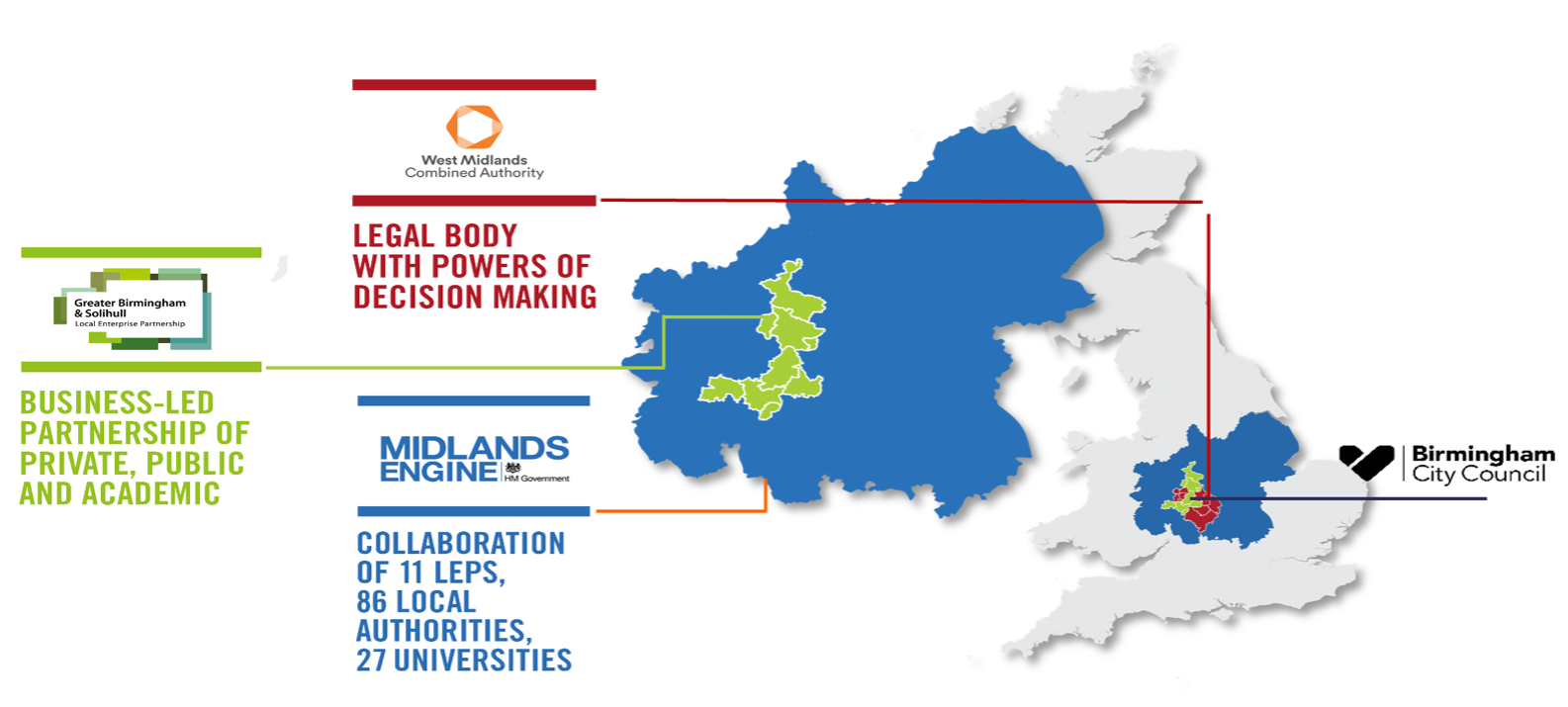
Nationally, we support the Government to make evidence-based policymaking, particularly through the work of ERC, Centre for Growth, CREME, Advanced Services group and our Energy and Bioproducts Research Institute (EBRI). This approach is exemplified by our work on ‘Help to Grow’: Management. A national programme where our Centre for Growth Director was Curriculum Director working with The Rt. Hon. Rishi Sunak MP to shape the programme.
Internationally, we strategically focus on projects where we can make a significant societal impact through our research and teaching, including through our Goldman Sachs entrepreneurship work in India to support the 10,000 Empowering Women enterprise education programme. Such international projects help Aston’s international office increase postgraduate recruitment in areas such as India and Nigeria, attracting highly entrepreneurial students.
Our Aston for Life platform supports alumni across the world with Continued Professional Development. This achieves both goodwill and engaged alumni who offer their time, donations and investments towards the university and its spinouts, further supporting the region’s growth.
Aspect 2: Activity
Our holistic approach focuses on translating cutting-edge research into programmes that support local businesses and people with practical solutions and training, whilst also using our anchor institution status to support local growth.
1. Education, Entrepreneurship and Employment
Addressing skills gaps: Our Business Insights team generates labour market information and collaborates with academics and employers to develop courses that build skills that employers need. Committed to closing the STEM skills gap, we have developed labour-market-informed skills bootcamps, short training courses, and encouraged local students into STEM through our school –Aston University Engineering Academy.
We are a core partner in the National Institute of Coding, delivering software development bootcamps to learners in the region. In 2022, we secured funding from WMCA to deliver cybersecurity and sustainability bootcamps, supporting managers in business to consider climate change challenges, whilst maintaining business performance and profitability.
We support the skills development of local people, including SME workers, via:
Degree apprenticeships and work-based learning
Executive development
European Social Fund (ESF) projects
2000+ learners commenced apprenticeships (as of 2023) and we partnered with 300+ employers to deliver training. Our £200,000 levy pledge to the WMCA’s Apprenticeship Levy Transfer Scheme has led to 23 apprentices having costs covered. 11 local businesses have benefitted from our apprenticeship levy donation, increasing job opportunities and boosting regional skills and productivity.
We support local people to become entrepreneurs through ESF projects, such as Pathways to Enterprising Futures. We support our staff to be entrepreneurial and currently have 7 active spin-outs that are attracting significant investment into the region.
Placements and graduate retention in the region
In 2021/22, 1802 students (65% of undergraduates) undertook a placement.
The latest data for our graduate retention in the West Midlands region shows:
2019/20 – 42.3% retained in West Midlands (268 students). Of these, 59% (158 students) worked in Birmingham.
2018/19 – 40.1% retained in West Midlands (237 students). Of these, 57% (135 students) worked in Birmingham.
2017/18 – 48.6% retained in West Midlands (172 students). Of these, 51% (87 students) worked in Birmingham.
Aston Enterprise supports students and graduates to develop enterprising skills to increase employability.
2. Sustainable and Socially Inclusive Prosperity
We are members of the Birmingham Anchor Network sharing best practice across network partners, which has resulted in our procurement strategy being updated to increase social value and sustainability focus. The Network has benefitted from expertise from our ERDF Diverse supply chains project (Professor Theodorakopoulos and Professor Ram).
In 2022, the Commonwealth Games took place in Birmingham. Aston sponsored the Games through provision of optometry expertise and equipment in the polyclinics. Use of our site enabled Birmingham to shine on a global stage as a positive destination for students, staff, visitors and investors.
As a University of Sanctuary, we https://www.aston.ac.uk/about/region-and-society/university-sanctuaryintroduced support for sanctuary seekers enabling them to integrate and thrive, including support for Ukrainian refugees through projects to train local translators, and support Ukrainian entrepreneurs.
Our strategic partnership with Aston Villa Football Club supports international student recruitment to the region. Sports Marketing students study the growth of AVFC women’s team to provide solutions to grow women’s game attendance, increasing regional income.
Our Centre for Research into Ethnic Minority Entrepreneurship demonstrates the impact that ethnic minority entrepreneurs have on the economy and the potential they have to contribute further with support through the Time to change report, a blueprint for advancing the UK’s ethnic minority businesses.
In 2021 the Centre for Personal Financial Wellbeing (CPFW) moved to Aston, and is investigating the causes and consequences of personal and household financial insecurity, supporting leaders in the financial service industry, third-sector organisations and citizens with timely evidence.
Internationally, our engineers recycled plastic waste and 3D-printed sports wheelchairs in Africa. Our Photonics group developed low cost/high-speed internet connections for schools in communities with no existing infrastructure.
3. Wider Business Support
We support businesses in the GBSLEP area, and adjoining LEPs, through our ERDF projects such as ‘Smarterials’ (helps SMEs with business growth through research, testing and expertise in material science) and through national programmes such as ‘Help to Grow’.
Aston facilitated brand-new strands of knowledge exchange with GBSLEP support (i) Smart Urban technologies Grow the Economy (SURGE) £549,689 and (ii) Urban Biochar and Sustainable Materials Demonstrator (Biochar) £306,000. This led to a West Midlands Innovation Accelerator project to develop a cluster of businesses innovating with biochar. We are also part of DIATOMIC and ‘6D’ Innovation Accelerator West Midlands Innovation Accelerator projects supporting local cluster development.
We part-funded and delivered the WM-REDI project ‘Lifting the lid on Enterprise Diversity and Growth in the West Midlands’, which collected and analysed data on business creation of West Midlands ethnic minorities to add to the Global Entrepreneurship Model dataset.
Aston supported Midlands Engine with ‘Universities as drivers of FDI’, securing investment to sell regional R&D strengths. Our Centre for Business Prosperity is building evidence on how Midlands-based businesses have fared post-COVID/Brexit to understand factors impacting export. Aston, together with Midlands Innovation Universities and Midlands Engine, are developing a Midlands Investment Vehicle bringing millions of pounds of investment into regional businesses.
Aspect 3: Results
In 2020, Aston University was named University of the Year by the Guardian and Entrepreneurial University by Times Higher Education, demonstrating our credentials as a university delivering on inclusion, social mobility, sustainability and entrepreneurship.
In 2021, the Nous Group conducted focus groups on the University Strategy with beneficiaries to support the development of Aston 2030. Feedback included:
“Aston is one of the most civically engaged universities – proactive at attracting students from diverse backgrounds which makes it a great partner.”
“We have a relationship with Aston because it works. We try to engage with other universities, but Aston is the best. They are full of people who care deeply about the development of people, students etc.”
Evidence of our impact by beneficiary group:
1. Students
Aston Enterprise: annually delivers 24 different sessions to 1000+ students and recent graduates.
Aston was 1 of 5 universities to pilot HSBC’s programme for black and ethnic minority student entrepreneurs, two Aston founders were selected and engaged in an online accelerator that pitched at HSBC Headquarters.
Apollo Accelerator: funded by Santander Universities, received 69 applications, 35 selected to participate.
Annual Aston Enterprise Pitching Competition: received 41 applications, all attended a pitching masterclass. The winner, Safe Queen (founded by three female postgraduate students), is an app designed to help make informed choices about venue safety on nights out.
BSEEN supporting student and graduate entrepreneurs: runs 3 bootcamps a year. 48 new businesses were started (2022) and has 83 active firms.
2. Business and the Professions
All ERDF-funded business support programmes are independently evaluated upon completion. Analysis shows participating companies benefit from faster growth, sustainable job creation, regional graduate retention and increased GVA.
At its peak, Aston has 18 ERDF and 3 ESF projects, creating significant impact for the region, e.g. the Bioenergy, Bioproducts and Energy Systems project, which aimed to accelerate small business innovation in sustainability to drive new growth, employment and export opportunities in the West Midlands.

Figure 3 Impact of the Bioenergy, Bioproducts and Energy Systems project
We invest heavily in KTP activity and are currently the most successful university regionally, with the 3rd largest portfolio in the UK. KTP reports showed Aston generated on average 1107% return-on-investment. Innovate UK recognised Aston’s KTP success at their national ‘Best of the Best’ KTP Awards 2020, which was communicated to local businesses and regional organisations through our website and Linkedin, achieving 10,000+ views.
Aston Centre for Growth’s Help to Grow Management Course supported 85 SMEs across 4 cohorts. Recent Green Advantage bootcamps have welcomed 87 people, with 88% of respondents strongly agreed/agreed that the workshops were valuable. Participants feedback included: “Now I understand the terms and everything involved in a sustainable business, I feel that I can better build my business plan, my business model, incorporating things like monitoring my gas emissions.”
Our spin-outs have attracted international investors to invest locally – Aston Particle Technologies recently secured a £1m investment from investors, including an international Aston University alumnus.
Other drug development projects have also secured >$2M from US investors, teaming up with Isterion Biotech to develop novel drugs to treat fibrotic diseases.
Aston Vision Sciences has raised £950,000 in public and private finance, including international angel investment.
3. Region and Society
Evidence from the Citizens Survey 2022 showed the most common descriptor of Aston University is professional (34%), followed by welcoming (23%) and supportive (21%).
Figure 4 Local residents’ perceptions of university benefits
Our community engagement through Aston Villa Football Club (AVFC) gives us increased reach – AVFC social media posts for Open Day achieved 40,143 impressions and 4,046 clicks, enabling us to reach our registration targets. UCAS deadline reminders on AVFC emails reached an audience of 55,725,16,854 opens and 384 clicks.
Evaluation of the Villa Vision project recorded: over 2,900 children received vision/colour vision screening checks, nearly150 received fully comprehensive eye examinations, approximately 200 pairs of glasses prescribed (2 pairs per child). In total, 3% of children failed the colour vision screening and 5% were offered full eye examinations. Reading efficiency test results showed children in Villa Vision participating schools are doing better than those in comparable schools and national averages.
Our European Social Funded project ‘Pathways to Enterprising Futures’ has worked with 175+ participants who are getting into work or starting their own business.
The Productivity from Below Project won the 2021 ESRC Impact Prize for improving productivity among BME microbusinesses during the pandemic, by helping practitioner partners secure £3million+ funding to support 1000+ female and migrant entrepreneurs.
Nesta and Citizens UK released the 2021 ‘Democratising Innovation Policy’, featuring CREME initiatives such as the Business Leaders Group in collaboration with Citizens UK Birmingham.
The Birmingham 2022 Commonwealth Games welcomed 5million+ people to the city centre during the Games, a 200% increase (against the same period in 2021), bringing huge benefits to the local economy. As an ‘Official University of the Birmingham 2022 Commonwealth Games’, we increased our brand awareness, and, subsequently, interest in our courses – particularly Optometry, which was a key focus of our Games’ involvement (on LinkedIn, 8 posts resulted in 99,179 impressions and 2,279 reactions).
Public & Community Engagement
Summary of approach
Public engagement underpins Aston University’s 2018-2023 Strategy, which focuses on serving our 3 beneficiary groups: Students; Business and the Professions; Region and Society.
Our public and community engagement objectives are fourfold:
1, To be a civic university serving our local community.
2, To raise Aston’s profile in the region and beyond through KE, drive student recruitment and assist income diversification.
3, To engage citizens in research and teaching, enabling them to contribute, collaborate and coproduce for maximum impact.
4, To provide evidence to ensure that policy is evidence-based.
Our key partners in public and community engagement are Citizens UK, Aston Villa, Birmingham Community Healthcare Trust, Birmingham Women and Children’s NHS Trust, regional schools and colleges.
Aspect 1: Strategy
Our public engagement strategic objectives are outlined above.
Public and community engagement underpins our Civic University Agreement, our Knowledge Exchange Strategy and our CSR Policy. Our focus is:
1, Widening participation and social mobility.
2, Supporting communities, particularly through our expertise and networks.
3, Developing strategic partnerships with key NHS and community partners.
4, Sharing/coproducing research, evidence and practice with the public.
Planning process
We assessed our public engagement support through the NCCPE EDGE tool, worked with Metro Dynamics to evidence our impact in the region, and commissioned a citizen survey in both 2019 and 2020 in local wards to understand their awareness of Aston, priorities, and views on planned activities. This evidence underpinned our CSR policy and our Civic University Agreement (developed in partnership with Birmingham Community Healthcare NHS trust, WMCA, GBSLEP, Birmingham City Council, Greater Birmingham Chamber of Commerce, Aston Villa Foundation and Aston Students’ Union).
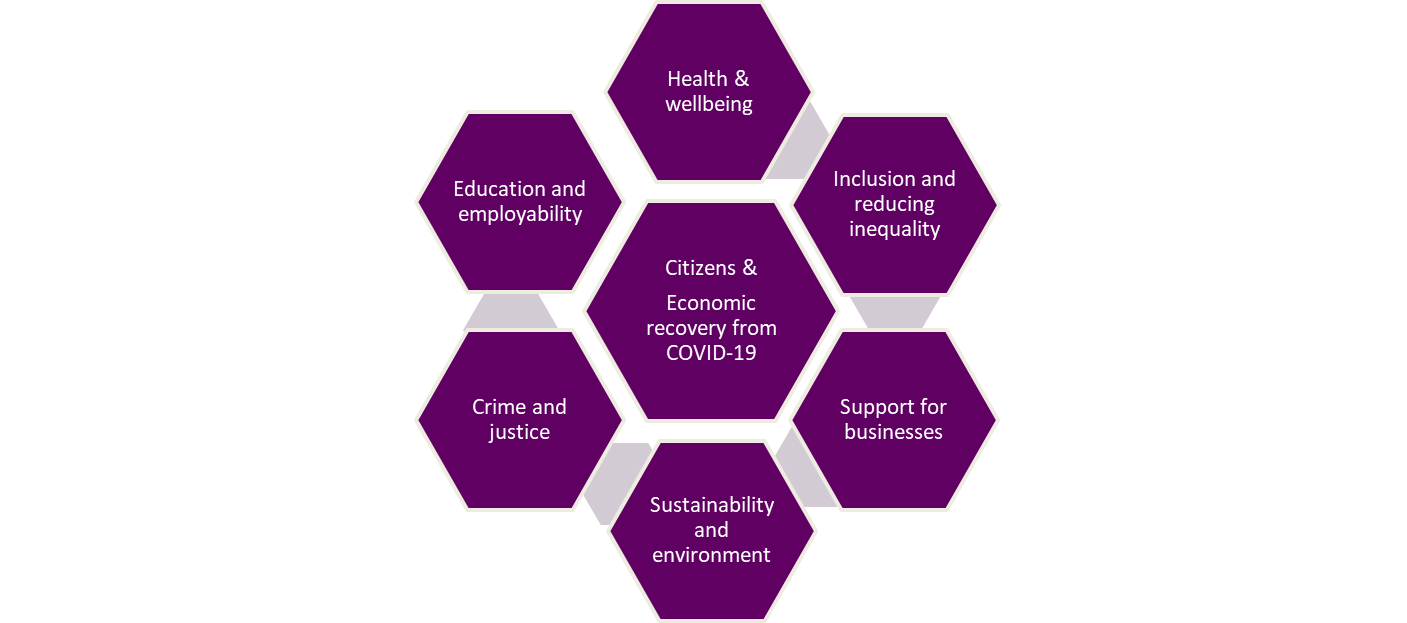
Figure 1: Our Civic Agreement activity themes
Governance structures and leadership arrangements for P&CE
Public and community engagement is ultimately overseen by Executive. KE Oversight Group undertakes detailed oversight, reporting into the Research Committee and Learning and Teaching Committee. Executive Engagement Group oversees non-teaching and research elements. Public and community engagement KPIs are monitored by the KE Oversight Group, with other committees reviewing higher-level KPIs.
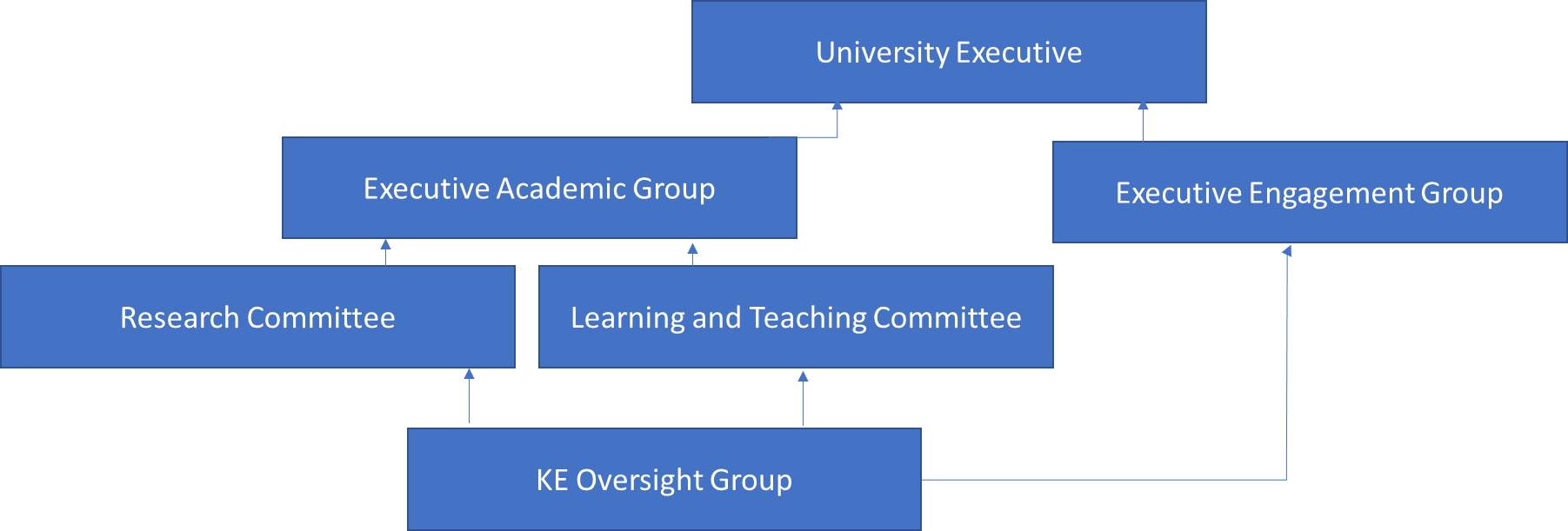
Figure 2: Organisational structures overseeing Public and Community Engagement

The Aston approach is informed by staff and beneficiaries. Based in super-diverse Birmingham (the first city with a white minority, and which has high levels of deprivation) Aston has high local student recruitment (Birmingham: 34%, West Midlands: 49%), an Inclusive Strategy, a Pro-Vice-Chancellor for EDI, and staff networks to ensure the voices of underrepresented groups are heard (LGBTQ+, disability, BAME, parents and carers, and menopause).
Resourcing
The Regional Engagement Team manages public and community engagement, working across colleges and Professional Service teams to ensure that engagement underpins all activity. Council – which includes key regional leaders – oversees the University. Each College has: an Associate Dean for Public Engagement (ADPE), an advisory board that includes local business, public and community representatives, Public Engagement Conveners, and Business Support and Skills Project Managers. The Business School boasts several centres with significant public and community engagement, including: Centre for Growth, Centre for Research into Ethnic Minority Entrepreneurship (CREME) and Centre for Personal Financial Wellbeing.
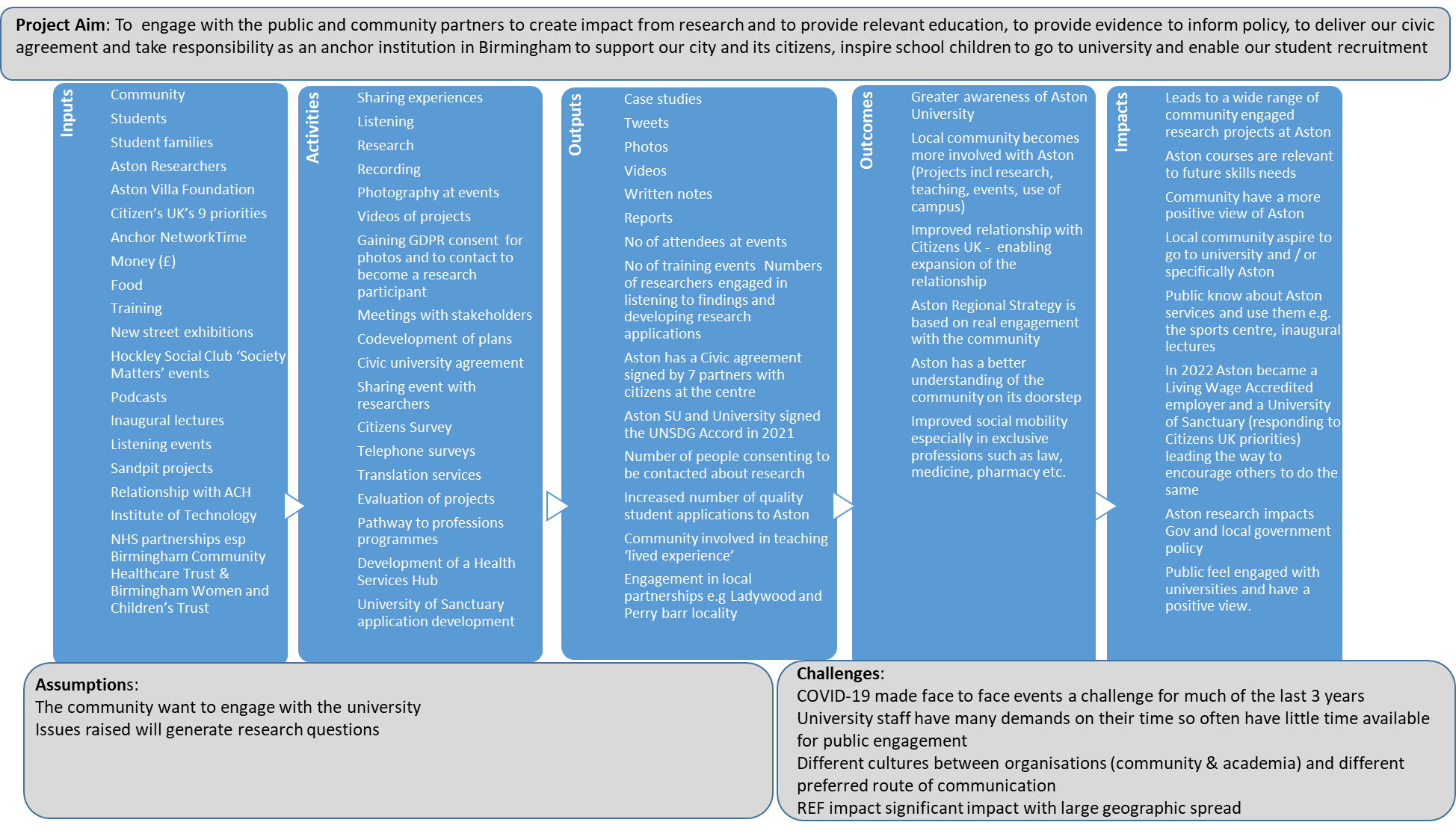
Figure : Logic model outlining approach and intended impacts
Aspect 2: Support
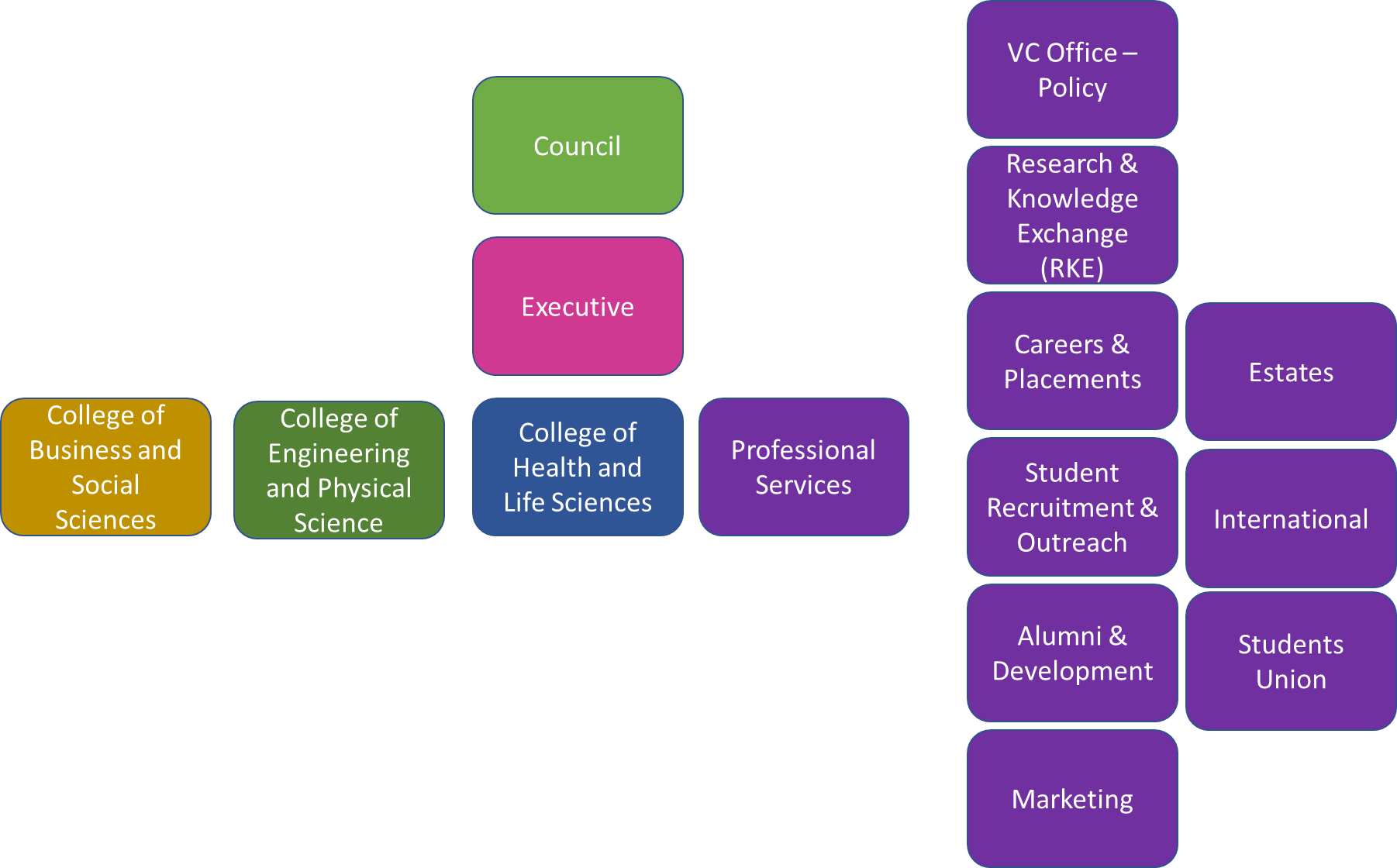
Figure 5: Teams supporting public and community engagement
Specific support
1, Key strategic partnership development: each is underpinned by an MOU, and an operations group that meets on a regular basis for partnership development, to enable high-level access to the organisation, to understand their key drivers and priorities and facilitate engagement.
NHS partners: Birmingham Community Healthcare NHS Trust and Birmingham Women and Children’s Hospital Trust and Birmingham Health Partners; and developing relationships with Sandwell and West Birmingham, Dudley and Wolverhampton.
We are members of the Ladywood and Perry Bar locality partnership that integrates the community with the NHS (Flourish MOU) to build community capacity and resilience as a model for wider roll-out.
Citizens UK: a key relationship with education, faith, community, union and diaspora organisations providing intelligence on issues which affect local lives.
Aston Villa Football Club and Foundation: we collaborate to support communities and the football club provides international reach to the public.
LoveBRUM: as patrons, we work together to support ‘hidden gem’ projects across Birmingham that deliver real change and positive outcomes for the community.
Birmingham 2022 Commonwealth Games: we were a Tier3 sponsor which enabled Aston to raise its regional and international profile, particularly that of our School of Optometry.
2, Training: researchers can access internal training to support societal engagement, and staff can access a 10-week ‘Engagement Professional’ course. Students can access such skills through courses such as The Aston Global Advantage, which includes modules on Citizenship and Engagement.
3, Volunteering opportunities are sourced for staff and students across a number of partners and sectors to support civic engagement.
4, Public engagement opportunities are made available for staff to engage with the public through the media, The Conversation (independent news source), events, podcasts, videos, social media.
5, Event sponsorship that fits with and furthers our ethos (e.g., Women of the Year and Multicultural Business and Community Champion Awards).
6, School Engagement: our Student Recruitment and Outreach office runs regular inspiring events in schools to encourage young people into education opportunities.
Resourcing for Public engagement includes College Associate Deans for Public Engagement, internal funds for public, regional and civic engagement, and impact (£150k p.a), Impact Acceleration Accounts (across BBSRC, ESRC and EPSRC ~£444k p.a) and Policy Support Funding (currently ~£100k p.a.), with HEIF being used for knowledge exchange activities.
Recognition
Our academic promotions criteria require demonstrable knowledge exchange, usually including public engagement. Aston Achievement Awards include recognition of:
Excellence in Citizenship of Volunteering work
Outstanding Contribution to Civic or Public engagement
Exceptional International Activities
The Inclusive Aston team ensures internal equality and inclusion, and the RKE team supports external inclusive engagement e.g., Eye Health Listening events were held in communities to increase accessibility and inclusivity.
Through our Athena Swan awards (Silver across the university and Gold in Engineering) and Race Equality Charter (awarded bronze in 2022), the inclusive Aston team monitors equality of uptake in funding, securing research awards and promotions and are continually improving our processes to support further equity.
Aspect 3: Activity
Key Programmes addressing each objective:
1, To be a civic university serving our local community
(a) We leverage our strategic partnerships to support communities, such as the Eye Health listening project with Aston Villa Foundation, Citizens UK and community partners to understand issues that communities surrounding the university face; and to shape the Villa Vision Project (collaborative project between the Foundation and University, funded by PFA, Premier League, Aston University and Essilor Luxor’s OneSight) which supports 2,000+ inner-city children with tools to improve educational outcomes through improving eye health.

Infographic 1: Summarising eye health project findings and impact
2, To raise Aston’s profile in the region and beyond to drive student recruitment and to assist income diversification
Birmingham 2022 Commonwealth Games: we provided access to our Optometry equipment and 7 Optometrists to raise the profile of Aston Optometry across the world. This led to the dispensing of 159 pairs of spectacles and 5,000+ Twitter impressions in relation to this work.
Pathway to the Professions schemes: our Student Recruitment and Outreach team supports students from deprived backgrounds into professional degree programmes such as law and medicine.
Aston University Engineering Academy: delivers employer-led project curriculum ensuring students leave with strong enrichment and high academic outcomes.
Degree Apprenticeship Programmes: our range of degree apprenticeships support people into paid jobs while learning, such as project management and professional engineering.
Greater Birmingham and Solihull Institute of Technology: we host this on our site to improve social mobility by providing a pathway for local learners into higher education.
We inspire young people through events and projects such as:
Women: Innovation, Technology, Strength: we organise this annually to inspire women and girls into innovation technologies, and network with successful women in business and science.
CityFest: our Science Festival – featuring autonomous robots and self-driving cars – to inspire school children to consider STEM careers.
Tackling the Gender Imbalance: The UKESF is Getting More Girls into Electronics: our engineers created materials for the project now being rolled out across the UK.
Exhibitions in New Street Station (e.g., 75 years since India’s partition), Society Matters free monthly scientific café for the intellectually curious and sessions at Thinktank | Birmingham Science Museums help reach a diverse range of audiences.
We support the development of leadership potential through YouWIL (young women in leadership), an international programme for girls aged 14-16 to inspire future female leaders, and Common Purpose 150, a leadership programme for 18-25s to create a greener Birmingham.
We work with teachers across the UK through our English department to change primary school level education, develop their pupils’ understanding of cognitive stylistics, and collaborate to develop secondary-level resources.
3, To engage citizens in research and teaching, enabling them to contribute, collaborate and coproduce for maximum impact.
(a) CREME developed a series of projects with partners such as Citizens UK, including: ‘Black New Street’ (a documentary on Birmingham’s black businesses), ‘Pathways to Enterprising Futures’ (leadership development programme for diverse artists and entrepreneurs), and ‘Inclusive Business Support Ecosystem’. This resulted in CREME winning the ESRC Outstanding Business and Enterprise Impact Award.
(b) https://chiefprojecteu.com/ builds effective dialogue between young people, education practitioners, civil society activists, community leaders and policymakers to facilitate a future Europe based on inclusive notions of cultural heritage and cultural identity.
(c) Our AHRC-funded Upholding Multilingualism project ran Ukrainian emergency interpreting training to overcome language barriers encountered by refugees. Our Centre for Growth is also supporting Ukrainian entrepreneurs to establish businesses.
(d) Evidence to ensure that policy is evidence-based.
Over the last 3 years we have supported 25 pump priming projects to develop evidence to inform policies, such as: the Birmingham and Solihull ICS Health Inequalities Strategy, Birmingham Food Strategy, Cybersecurity policies, and policy around business support for ethnic minority entrepreneurs.
In partnership with Birmingham Community Healthcare NHS Trust (BCHC) and Black Country Healthcare NHS Foundation Trust, Community Connexions (a patient and public engagement programme) we captured lived experiences of local communities accessing healthcare services). We shared the findings with the ICS Health Inequalities Board and West Midlands Combined Authority (WMCA) to inform the ICS Health Inequalities strategy and WMCA support for local communities.
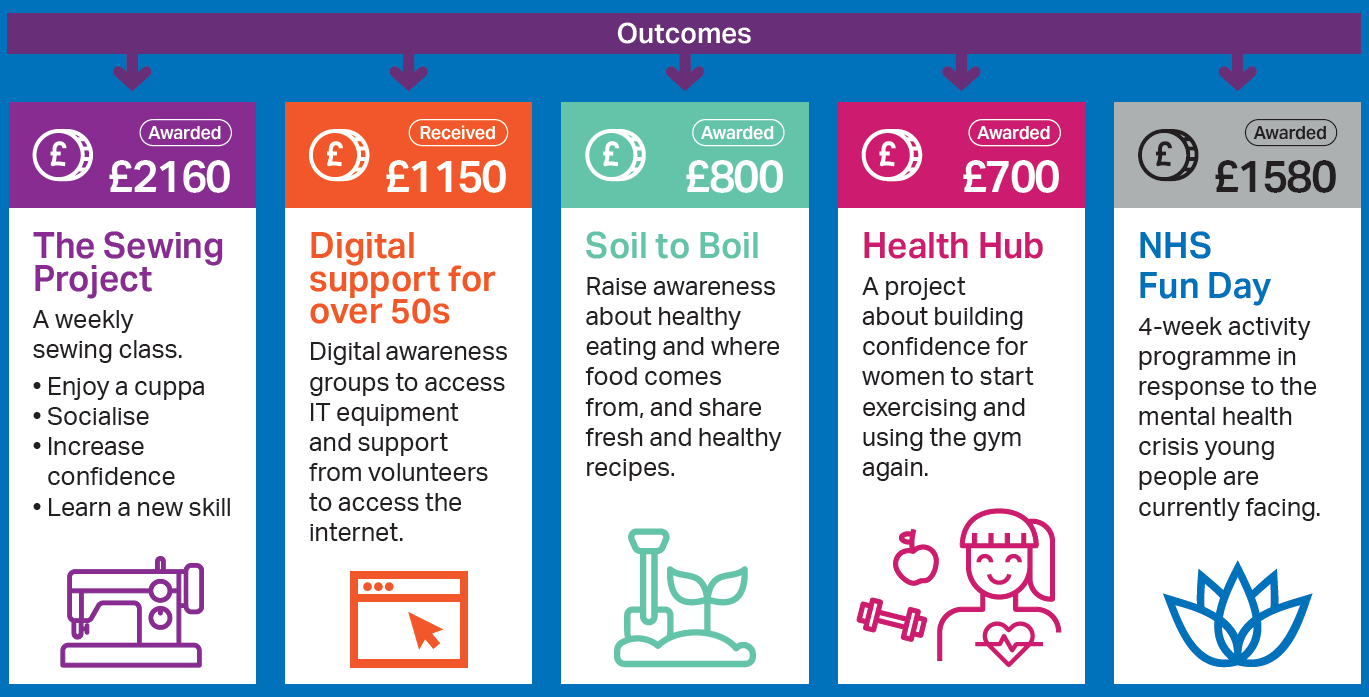
Infographic 2: Funded sandpit projects from community organisations for health improvement
This approach has now been adopted by NHS partners and informs our planned Health Services Hub, supporting our students and local communities to access integrated healthcare.
Additional examples of policy impact include:
Dr Lowe’s work with the Centre for Reproductive Research and Communication (CRRC) at BPAS (a major provider of abortion care) which resulted in development of ‘bufferzones’ to protect women.
Centre for Personal Financial Wellbeing’s collaboration with local councils which took a co-operative approach to engaging service providers to create a ‘Financial Wellbeing Partnership’, and exploring the financial impact of harmful gambling.
Our psychologists developed the Child Feeding Guide influencing guidelines across 4 continents.
We also share our expertise with public sector professional to improve policy and practice through CPD, e.g., Aston Institute of Forensic Linguistics on the use of forensic linguistics in online child sexual abuse investigations.
Aspect 4: Enhancing practice
All our major public and community engagement programmes are evaluated and report on challenges, outcomes and impact. Evaluation is either conducted using external consultants for independent evaluation e.g., ERDF/ESF/ similar programmes or utilising our own academic experts to evaluate key programmes, e.g., Villa Vision, where we sourced funding through internal funds (£9k) and the Wesleyan Foundation (£20k). Alternatively, we conduct the evaluation through our central departments, e.g., The Research and Knowledge Exchange team evaluated the impact of our sponsorship of the Commonwealth Games.
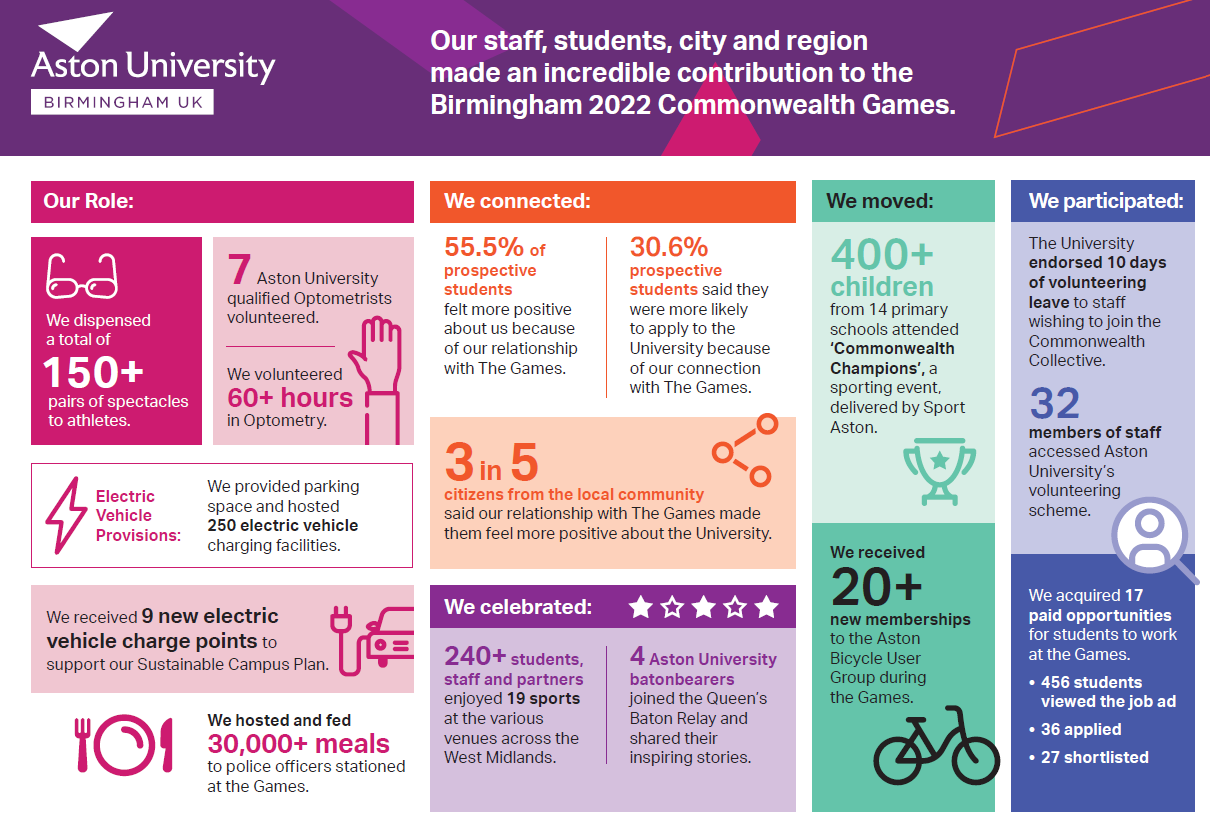
Infographic 3: Impact of our sponsorship of the Commonwealth Games
Student Recruitment and Outreach evaluates all its programmes to demonstrate their impact and ensure continuation of activities is based on delivery outcomes.
Press and Communications team uses Cision media monitoring to confirm reach and value of our publicity.
For Partnerships such as with Aston Villa Football Club and The Conversation, the partner provides an evaluation report annually on key impact statistics. The Executive then leads reviews to confirm that the partnership is delivering.
Through the KE Oversight group, we have developed draft KPIs that are currently being tested for efficacy in monitoring our public engagement including:
Positive view amongst community (measured by an independent Citizens Survey conducted every 3 years) – links to objective 1.
Public and community engagement KEF self-assessment score as an indicator that we are making positive changes to our strategy and delivery across all objectives.
Income involving public and community partners (Collaborative research income + Consultancy + facility income) – objectives 1 and 3.
Marketing – number of stories published by PR and Comms team – objectives 2 and 3.
Policy engagement – number of policies impacted – objective 4.
Our Aston 2030 Strategy will include updated public and community engagement plans and a framework for evaluation.
Aspect 5: Building on success
Evaluation of support (2), activity (3) results (4).
In preparation for our Knowledge Exchange Concordat submission, we conducted a gap analysis and self-evaluation which included using the EDGE tool to reflect on where we want to be as an institution. We set up a working group chaired jointly by our Pro-Vice-Chancellor for Research and Executive Director of Business Engagement. Membership is drawn from across the University. Our evaluation included:
An independent review of progress against the University’s 2018-2023 beneficiary-led strategy involving focus groups with each beneficiary group. The review confirmed that the beneficiary-led philosophy of the strategy has been a success. It outlined opportunities for Aston to progress its support for employer co-sponsored education, business partnerships for employability and innovation, and even stronger regional engagement.
Concordat principles underpinned development of our Knowledge Exchange (KE) strategy and included extensive consultation to challenge assumptions, optimise delivery and to identify areas for further evaluation and analysis.
A bespoke survey was developed and used by Executive and senior KE staff across the University. This explored current performance against each of the principals and provided the opportunity for narrative contributions. This process helped us to build a detailed understanding of the areas where there were significant gaps and need for further investigation.
KE activities are regularly reviewed and improved through our KE Oversight group which meets monthly and includes RKE leaders plus College Associate Deans for Public Engagement and Associate Deans for Impact. This group also reviews our KEF performance as a tool for self-improvement.
The KE Oversight group reports into Research Committee and Learning and Teaching Committee as well as Executive Engagement Group.
Official reporting such as HE-BCI, HEIF annual monitoring return and KEF are all reported to Executive before submission.
In 2022, Professor Aleks Subic joined as Vice-Chancellor and is developing the Aston 2030 Strategy to take the University to the next level. Increased support in areas such as political engagement, development of strategic partnerships and strategic marketing will underpin the strategy, and there will be a focus on people, place and beneficiaries.
Note You are currently viewing the latest version of this narrative statement. View the previous version as published in previous iterations of the KEF (KEF1 and KEF2)